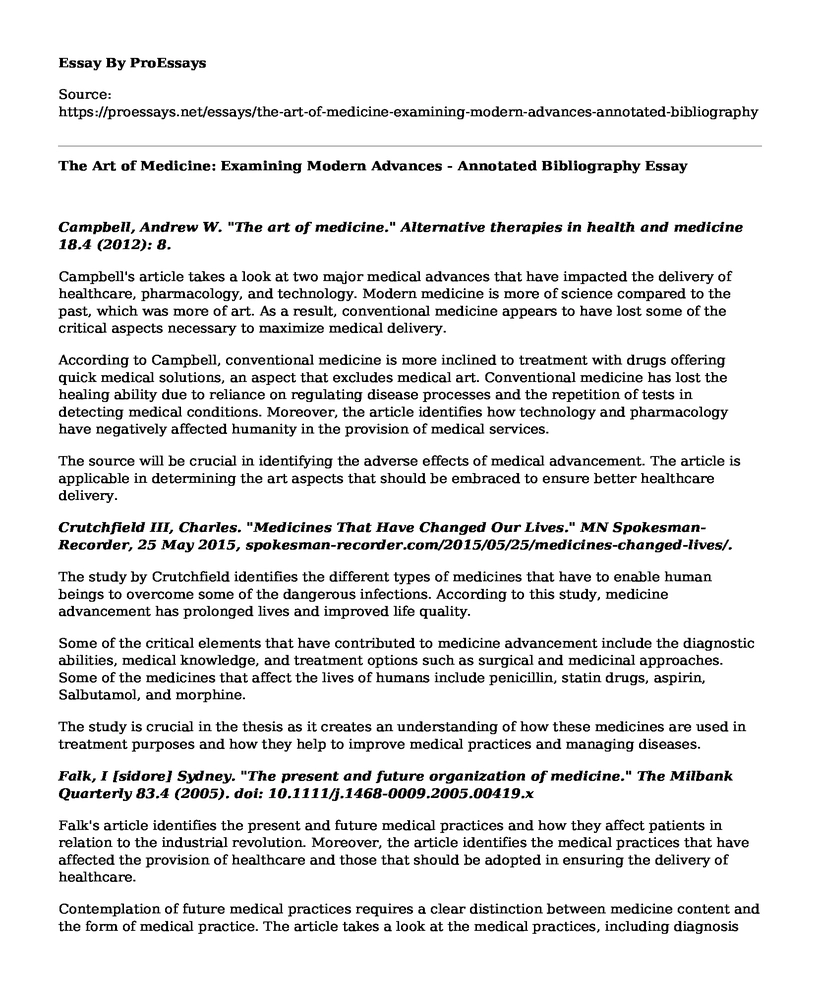Campbell, Andrew W. "The art of medicine." Alternative therapies in health and medicine 18.4 (2012): 8.
Campbell's article takes a look at two major medical advances that have impacted the delivery of healthcare, pharmacology, and technology. Modern medicine is more of science compared to the past, which was more of art. As a result, conventional medicine appears to have lost some of the critical aspects necessary to maximize medical delivery.
According to Campbell, conventional medicine is more inclined to treatment with drugs offering quick medical solutions, an aspect that excludes medical art. Conventional medicine has lost the healing ability due to reliance on regulating disease processes and the repetition of tests in detecting medical conditions. Moreover, the article identifies how technology and pharmacology have negatively affected humanity in the provision of medical services.
The source will be crucial in identifying the adverse effects of medical advancement. The article is applicable in determining the art aspects that should be embraced to ensure better healthcare delivery.
Crutchfield III, Charles. "Medicines That Have Changed Our Lives." MN Spokesman-Recorder, 25 May 2015, spokesman-recorder.com/2015/05/25/medicines-changed-lives/.The study by Crutchfield identifies the different types of medicines that have to enable human beings to overcome some of the dangerous infections. According to this study, medicine advancement has prolonged lives and improved life quality.
Some of the critical elements that have contributed to medicine advancement include the diagnostic abilities, medical knowledge, and treatment options such as surgical and medicinal approaches. Some of the medicines that affect the lives of humans include penicillin, statin drugs, aspirin, Salbutamol, and morphine.
The study is crucial in the thesis as it creates an understanding of how these medicines are used in treatment purposes and how they help to improve medical practices and managing diseases.
Falk, I [sidore] Sydney. "The present and future organization of medicine." The Milbank Quarterly 83.4 (2005). doi: 10.1111/j.1468-0009.2005.00419.x
Falk's article identifies the present and future medical practices and how they affect patients in relation to the industrial revolution. Moreover, the article identifies the medical practices that have affected the provision of healthcare and those that should be adopted in ensuring the delivery of healthcare.
Contemplation of future medical practices requires a clear distinction between medicine content and the form of medical practice. The article takes a look at the medical practices, including diagnosis and treatment options, and how they are continually changing to improve healthcare provision. The article notes the future changes that should be embraced by medical practitioners to meet the needs of the patients.
The article is applicable in the thesis as it helps identify how the current medical practices affect the world and the gaps that exist to improve on healthcare delivery, including improving on technology and health insurance.
Gameiro, Gustavo Rosa, et al. "Precision Medicine: Changing the way we think about healthcare." Clinics 73 (2018). DOI: 10.6061/clinics/2017/e723
According to this article, the advancement of medicine has reduced the mortality rates emanating from dangerous diseases. The article provides a discussion of genomics and genetics in the medical process. The article also discusses the application and impact of precision medicine in different specialty fields
The study evaluates the transition from traditional medical practices that are founded on symptoms, analysis, and cure to a modern approach that is based on preventative measures and personalized treatment. According to this study, medical practices should now focus on shifting from evidence-based to precision-based.
The study is applicable in the thesis as it demonstrates the current practices, including psychiatry and oncology, as well as explaining how future methods with impact practices such as tissue engineering and regenerative medicine.
More, Balaji. "Overview of medicine-Its importance and impact." DJ Int J Med Res 1 (2016): 1-8. doi: 10.18831/djmed.org/2016011001
More's article reviews the development and evolution of medicine as well as the significance of medicine and the science of healing. The article identifies the different medical arts and practices that have been practiced by humans from prehistoric times to the present time and how they have been used to offer treatment solutions.
More identifies some of the remarkable advancements in developing treatments for many dangerous ailments, thereby saving more lives. Human beings believe that medicine can manage diseases, and it can be used to improve the well-being and health of patients. More identifies the different types of medications practiced both in the traditional and the society and provides their differences in offering medical solutions.
Information from this article could be used to identify how the field of medicine has evolved and how it has continuously revolutionized treatment for dangerous diseases. The study will help determine the gaps in the medical field and future research that should be taken to improve the medicine delivery of incurable illnesses.
Cite this page
The Art of Medicine: Examining Modern Advances - Annotated Bibliography. (2023, May 16). Retrieved from https://proessays.net/essays/the-art-of-medicine-examining-modern-advances-annotated-bibliography
If you are the original author of this essay and no longer wish to have it published on the ProEssays website, please click below to request its removal:
- NAADAC Code of Ethics
- Kidney Disease - Research Question Response
- Pharmaceutical, Work Health and Safety Legislation
- Essay Sample on Exploring PrEP Access for Women to Reduce US HIV Infection Rates
- Understanding Acute vs. Chronic Conditions in Healthcare - Essay Sample
- Essay Sample on Nurses and SDLC: Essential for Effective EHIS Acquisition
- Paper Example on Abortion and Religious Freedom







